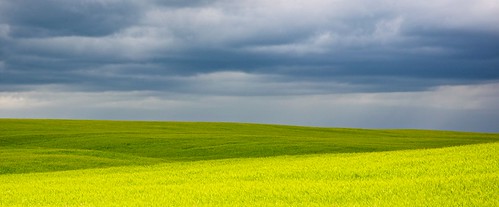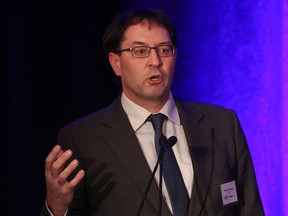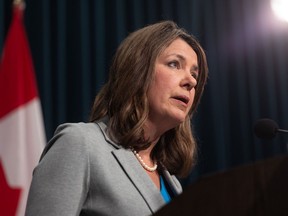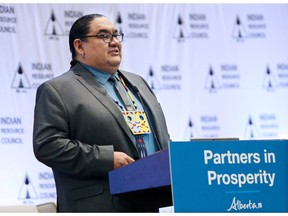Varcoe: ‘Unworkable, untenable’ — Alberta business leaders want Ottawa to scrap Canada’s oil and gas emissions cap
Alberta #Alberta

Breadcrumb Trail Links
The provincial government and a variety of groups are preparing to send in feedback in the coming days, spelling out their concerns with the federal program
Get the latest from Chris Varcoe, Calgary Herald straight to your inbox Sign Up
Published Feb 02, 2024 • Last updated 1 hour ago • 5 minute read
 A flare burns off methane and other hydrocarbons as oil pumpjacks operate in the Permian Basin in Midland, Texas, Tuesday, Oct. 12, 2021. The federal Liberals have provided details on their long-promised oil and gas emissions cap. David Goldman/The Canadian Press/AP
A flare burns off methane and other hydrocarbons as oil pumpjacks operate in the Permian Basin in Midland, Texas, Tuesday, Oct. 12, 2021. The federal Liberals have provided details on their long-promised oil and gas emissions cap. David Goldman/The Canadian Press/AP
At meetings in Ottawa this week, a delegation of Alberta business leaders delivered a single, clear message to federal officials about the incoming oil and gas emissions cap.
Advertisement 2
This advertisement has not loaded yet, but your article continues below.
THIS CONTENT IS RESERVED FOR SUBSCRIBERS ONLY
Subscribe now to read the latest news in your city and across Canada.
SUBSCRIBE TO UNLOCK MORE ARTICLES
Subscribe now to read the latest news in your city and across Canada.
REGISTER / SIGN IN TO UNLOCK MORE ARTICLES
Create an account or sign in to continue with your reading experience.
Article content
It came ahead of Monday’s deadline for public submissions about the new framework for the controversial federal policy, with provincial leaders from the energy, agriculture, telecom and financial sectors sitting down with federal civil servants.
Article content
“The unified message was that the cap, as presented, is unworkable, untenable, and it’s going to increase investment uncertainty,” said Deborah Yedlin, CEO of the Calgary Chamber of Commerce, which organized the trip.
During the COP28 summit in December, the Liberal government unveiled details for the cap on greenhouse gas emissions to be imposed on the country’s oil and gas sector.
The policy aims to lower emissions in the upstream sector by 35 to 38 per cent by the end of the decade from 2019 levels using a new cap-and-trade system. Ottawa has pledged to reach net-zero status by 2050.
Advertisement 3
This advertisement has not loaded yet, but your article continues below.
Article content
As proposed, the plan includes several flexibility measures that would allow companies to purchase some carbon offset credits, or contribute to a decarbonization fund, if they exceed their emissions allowances. Those steps could eventually lower the reduction figure to 20 to 23 per cent.
With the federal government now receiving submissions on the policy, it’s clear the Alberta government and industry leaders believe the policy is a non-starter.
“It’s very difficult to work with trying to make changes to it. It is designed as a production cap, although it is disguised as an emission cap,” Whitecap Resources CEO Grant Fagerheim said in an interview Thursday.
“This is the tipping point.”
Recommended from Editorial

Varcoe: Investors try to decode message sent by Ottawa’s emissions cap on oil and gas

Would Alberta win a court battle over the emissions cap? What is a cap-and-trade system? Here’s what you need to know

Varcoe: ‘They have to back down’ — Alberta, oilpatch blast Ottawa’s emissions cap

Oil, gas emissions to be cut more than one-third by 2030, but offset credits allowed
Calgary Sun Headline News
Thanks for signing up!
Article content
Advertisement 4
This advertisement has not loaded yet, but your article continues below.
Article content
The provincial government and a variety of groups are preparing to send in feedback in the coming days, spelling out their concerns with the federal program.
The Alberta government maintains the plan will curtail oil and gas production and infringe on the province’s exclusive constitutional rights surrounding resource development.
The head of the Explorers and Producers Association of Canada (EPAC) noted the cap is based on 2019 industry production levels. Yet, oil output has risen by seven per cent since then, while natural gas production has increased by 12 per cent, making the federal target even harder to reach.
EPAC president Tristan Goodman said the policy is likely unconstitutional and believes it will drive away investment because of the uncertainty it creates.
Advertisement 5
This advertisement has not loaded yet, but your article continues below.
Article content
“This is a rare time where fixes won’t work. It has to be scrapped,” he said Thursday.
“A cap on emissions, which is in this case a cap from the federal government on production, is not workable.”
 Tristan Goodman, president of the Explorers and Producers Association of Canada (EPAC), speaks during the Canadian Association of Energy Contractors 2023 drilling forecast luncheon at the Westin Calgary on November 23, 2022. Gavin Young/Postmedia file
Tristan Goodman, president of the Explorers and Producers Association of Canada (EPAC), speaks during the Canadian Association of Energy Contractors 2023 drilling forecast luncheon at the Westin Calgary on November 23, 2022. Gavin Young/Postmedia file
Alberta is the largest emitting province in the country, and the Canadian oil and gas sector was responsible for 28 per cent of national emissions in 2021.
Producers point out they’re reducing emissions per barrel, many companies have adopted net-zero targets, and the sector faces an array of existing federal policies to decarbonize.
These include an escalating national price on carbon, the clean fuel regulations and incoming rules to slash methane emissions by 75 per cent by the end of the decade.
Michael Belenkie, chief executive of Advantage Energy, said the policy would likely affect higher emissions-intensity production in the Canadian sector.
Advertisement 6
This advertisement has not loaded yet, but your article continues below.
Article content
Canada, the world’s fourth-largest oil producer, will be the first major exporter to adopt an industry emissions limit.
“For much of the industry, this might be a step too far,” Belenkie said.
“We’ll see widespread resistance and before this becomes a real problem for certain people within the industry, I would be surprised to see this not pursued vigorously through the courts.”
The provincial government has vowed to fight the cap and any attempt to lower production, with Premier Danielle Smith raising the possibility of using either Alberta’s Sovereignty Act or court action to oppose it.
 Premier Danielle Smith speaks to media at the McDougall Centre in Calgary on Thursday, Feb. 1, 2024. Brent CalverPostmedia
Premier Danielle Smith speaks to media at the McDougall Centre in Calgary on Thursday, Feb. 1, 2024. Brent CalverPostmedia
Andrew Leach, a University of Alberta professor in the department of economics and the faculty of law, said there are outstanding questions about the cap’s design — along with the constitutional questions around it.
Advertisement 7
This advertisement has not loaded yet, but your article continues below.
Article content
“It would be an interesting case. But if I had to bet on it, I would say that the courts would uphold something that looks like an oil and gas cap,” he said.
A challenge is likely, given the province successfully fought the federal Impact Assessment Act.
Stephen Buffalo, CEO of the Indian Resources Council of Canada, pointed out that First Nations are buying ownership stakes in natural resource projects across the country and won’t sit by if the cap makes it more difficult to invest.
“This (cap) is a real negative thing for First Nations here in Western Canada that are involved in these projects,” he said.
“They’ve overstepped their boundaries here and that needs to be tested.”
 Indian Resources Council president and CEO Stephen Buffalo. Gavin Young/Postmedia
Indian Resources Council president and CEO Stephen Buffalo. Gavin Young/Postmedia
The federal government plans to publish the draft regulations this year, with final regulations being published in 2025.
Advertisement 8
This advertisement has not loaded yet, but your article continues below.
Article content
The cap is expected to be phased in between 2026 and 2030.
“No industry should be allowed unlimited pollution; the oil and gas industry is no different,” a spokesperson for federal Environment Minister Steven Guilbeault said in a statement.
Industry executives note the sector is looking to invest in areas such as carbon capture and storage, along with technology to lower methane emissions.
Mike Holden of the Business Council of Alberta, who attended this week’s meeting in Ottawa, said the group is opposed to the cap and the effect it will have on Canada’s competitiveness and productivity.
He’s also worried it will impede investment in decarbonization efforts, while hitting one region of the country harder than the rest.
“The cap may not be intended to be punitive on one region, but the fact remains the vast majority of oil and gas production in Canada is in Alberta,” he added.
“That’s definitely a concern that we brought forward.”
Chris Varcoe is a Calgary Herald columnist.
cvarcoe@postmedia.com
Article content
Share this article in your social network